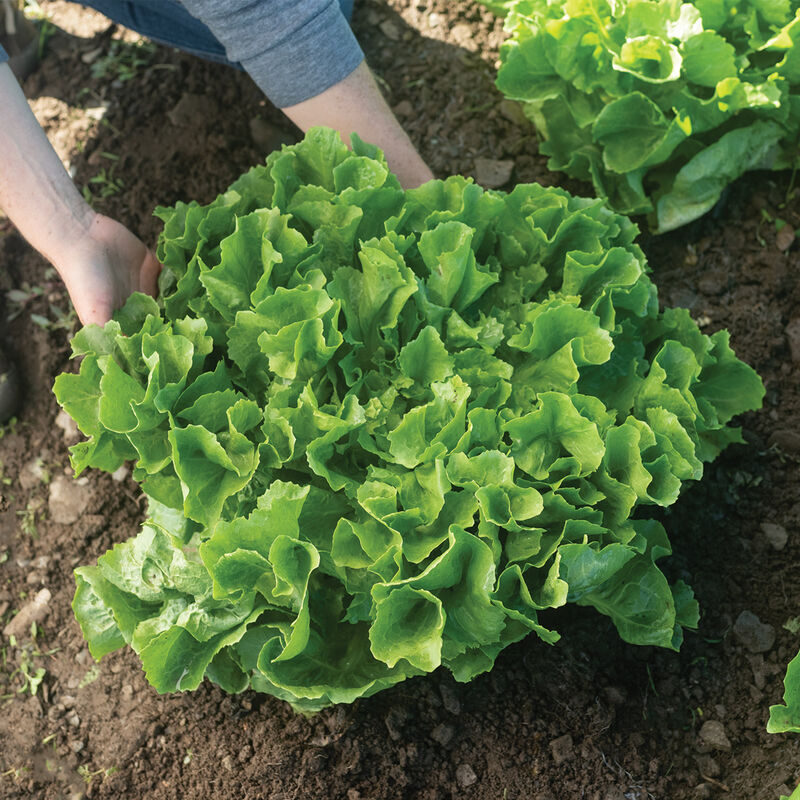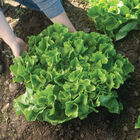Eliance Organic Escarole Seed
Product ID:4216G.114216G
Eliance Organic Escarole Seed
Product ID:4216G.114216G
Upright and slow to bolt.
Dark green escarole with delicate, nutty flavor. Later to mature than Eros, making it a nice complement in harvest timing. Suitable for all seasons. Better field-holding than Eros for summer, but less vigorous in fall/winter. USDA Certified Organic.Specs:
- This product does not ship to the following countries: United Arab Emirates, Austria, Australia, Barbados, Belgium, Bulgaria, Bermuda, Bahamas, Switzerland, Cyprus, Czech Republic, Germany, Denmark, Estonia, Spain, Finland, France, United Kingdom, Greece, Hong Kong, Croatia, Hungary, Ireland, Iceland, Italy, Japan, Republic of Korea, Kuwait, Cayman Islands, Lithuania, Luxembourg, Latvia, Malta, Netherlands, Norway, New Zealand, Oman, Poland, Portugal, Qatar, Romania, Saudi Arabia, Sweden, Singapore, Slovenia, Slovakia, San Marino, Thailand, Trinidad and Tobago, Taiwan, Ukraine.
SCIENTIFIC NAME:
Cichorium endiviaCULTURE:
Endive and escarole are hardy and can be planted as early as the soil can be worked. They are cool-weather crops and grow best at temperatures of 60–65°F (15.5–18.3°C). Careful variety selection is important for hot-weather plantings. For baby-leaf production, see the Baby Leaf Chicory culture.THERMAL DORMANCY:
Endive seed can enter thermal dormancy when exposed to high temperatures above 77°F (25°C). Optimum germination results at soil temperatures of 60–68°F (15.5–20°C).DAYS TO MATURITY:
From transplant; add 14–21 days if direct seeding.TRANSPLANTING (RECOMMENDED):
Sow in flats, 4 seeds/in., or in ¾" plug trays, barely covering seeds with fine vermiculite, 3–4 weeks before transplanting outdoors. Shade the flats on sunny, warm days if necessary to keep the soil surface cool, below 75°F (24°C), until germination. If sowing into flats, transplant 1–2" apart into flats, pots, or cell-type containers about 2 weeks later. Harden seedlings by reducing water and temperature for 2–3 days before planting outdoors. Properly hardened transplants can survive temperatures as low as 20°F (-6°C). Spacing closely at 8–10" encourages these varieties' self-blanching characteristics.DIRECT SEEDING:
Sow seeds 6 seeds per foot, rows 12-18" apart. Cover seed lightly, about 1/8", and firm soil gently. Dry soil must be watered to ensure coolness and moisture, and for uniform germination. Thin the seedlings 8" apart as soon as they are large enough to handle.AVG. SEEDING RATE:
1M/160', 5M/830', 25M/4,150', 175M/acre at 6 seeds/ft. in rows 18" apart.SUCCESSION PLANTING:
Sow every 3 weeks for a continuous supply of fresh endive and escarole.BLANCHING:
Our varieties are self-blanching, which typically occurs later in maturity. To "force" blanching earlier, or for a thorough white or cream blanch, use the French technique: about 3 days before harvest, rest a 4–6" cardboard disk or plate in the center of the plant (or tie the leaves up) to exclude light. Johnny's also offers Blanching Caps and a video of their use. These are a fixed size, so you must space plants at least as far apart as the caps are wide. NOTE: The above blanching methods are specific to Endive and Escarole and are not recommended for other chicory types.HARVEST:
Harvest whole head by cutting with a knife just above the root attachment. Cool quickly by dunking in cold water, drain, and refrigerate.TRANSPLANTS:
Avg. 500 plants/1,000 seeds (2 seeds per cell, thinned to one seedling).SEEDS/OZ.:
14,000–22,400 (avg. 18,000).PACKET:
200 seeds sows 33' full size.Johnny's is committed to your success, every step of the way.
We want you, our customer, to be 100% satisfied with all of our seeds, tools, and supplies.
If anything you purchase from us proves unsatisfactory, we will either replace the item or refund the purchase price.





